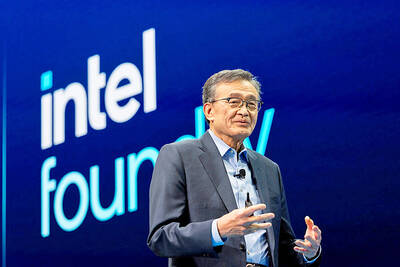Taiwan Land Development Corp (TLDC, 台灣土地開發) is adopting the name Taikai Group (台開集團) and is to raise NT$6 billion (US$201 million) in the next five years to take better advantage of its “smart” city, digital entertainment and preventive medicine businesses.
The company made its plans known at an investors’ conference in Taipei on Friday last week.
“We intend to expand our business interests at home and abroad,” Taikai Group chairman Chiu Fu-sheng (邱復生) said.
Toward that end, the company has adopted a new English name to reflect its diversified businesses that have grown from the development of government-owned industrial parks to the construction of residential complexes, theme parks, retail outlets, hotels and smart cities, Chiu said.
Several investment projects are about to bear fruit, he said.
A Taoist temple in Hsinchu County which has 148.84m2 of floor space is to begin operations later this month.
Religion is important for a healthy lifestyle, so the company is adding the facility to a theme park in Hsinchu to allow visitors to nurture their spiritual well-being, Chiu said.
Digital entertainment facility New Paradise (新天堂樂園) in Hualien, which is to be completed by the end of this year, is also to feature assorted sports activities, as well as augmented reality and virtual reality games, he said.
A flagship Starbucks outlet is due to begin operations in March, Chiu said.
The group is also to open a hotel with 186 guestrooms in Hualien by the end of next year, as well as teaming up with Marriott International Inc to operate another hotel with 320 rooms under the Aloft brand to court motorcycle riders, he said.
Aloft Hualien could begin operations as soon as April next year, he added.
In addition, the group expects to sell its Sunrise Village residential complex in Hualien that features the latest technology and an environmentally friendly design.
Taikai Group has also inked a cooperation pact with Japanese information science professor Ken Sakamura to turn Hualien into a smart city, making it more friendly for foreign visitors.
“The company aims to introduce cashless transactions in its facilities as e-commerce grows in popularity,” Chiu said.

Mercuries Life Insurance Co (三商美邦人壽) shares surged to a seven-month high this week after local media reported that E.Sun Financial Holding Co (玉山金控) had outbid CTBC Financial Holding Co (中信金控) in the financially strained insurer’s ongoing sale process. Shares of the mid-sized life insurer climbed 5.8 percent this week to NT$6.72, extending a nearly 18 percent rally over the past month, as investors bet on the likelihood of an impending takeover. The final round of bidding closed on Thursday, marking a critical step in the 32-year-old insurer’s search for a buyer after years of struggling to meet capital adequacy requirements. Local media reports

US sports leagues rushed to get in on the multi-billion US dollar bonanza of legalized betting, but the arrest of an National Basketball Association (NBA) coach and player in two sprawling US federal investigations show the potential cost of partnering with the gambling industry. Portland Trail Blazers coach Chauncey Billups, a former Detroit Pistons star and an NBA Hall of Famer, was arrested for his alleged role in rigged illegal poker games that prosecutors say were tied to Mafia crime families. Miami Heat guard Terry Rozier was charged with manipulating his play for the benefit of bettors and former NBA player and

TECHNOLOGICAL RIVALRY: The artificial intelligence chip competition among multiple players would likely intensify over the next two years, a Quanta official said Quanta Computer Inc (廣達), which makes servers and laptops on a contract basis, yesterday said its shipments of artificial intelligence (AI) servers powered by Nvidia Corp’s GB300 chips have increased steadily since last month, should surpass those of the GB200 models this quarter. The production of GB300 servers has gone much more smoothly than that of the GB200, with shipments projected to increase sharply next month, Quanta executive vice president Mike Yang (楊麒令) said on the sidelines of a technology forum in Taipei. While orders for GB200 servers gradually decrease, the production transition between the two server models has been

BETTER THAN EXPECTED: The firm’s Q3 results exceeded its projections, based on ‘the underlying strength of our core markets,’ chief financial officer Dave Zinsner said Intel Corp returned to profitability and gave an upbeat revenue forecast after PC demand grew, suggesting that it is making progress on a long and challenging comeback attempt. In the third quarter, revenue rose 3 percent to US$13.7 billion. The Santa Clara, California-based company posted its first quarterly net income since the end of 2023, with earnings per share of US$0.23, excluding some items. Analysts had estimated sales of US$13.2 billion and earnings per share of US$0.01 on average, according to data compiled by Bloomberg. Fourth-quarter sales would be roughly US$13.3 billion, the company said in a statement on Thursday. Intel shares gained about